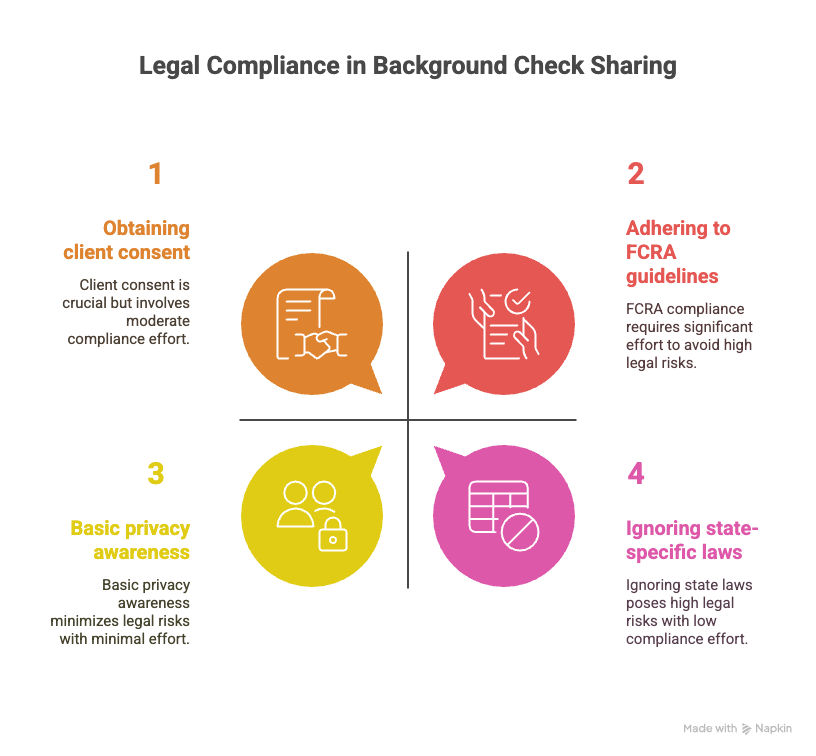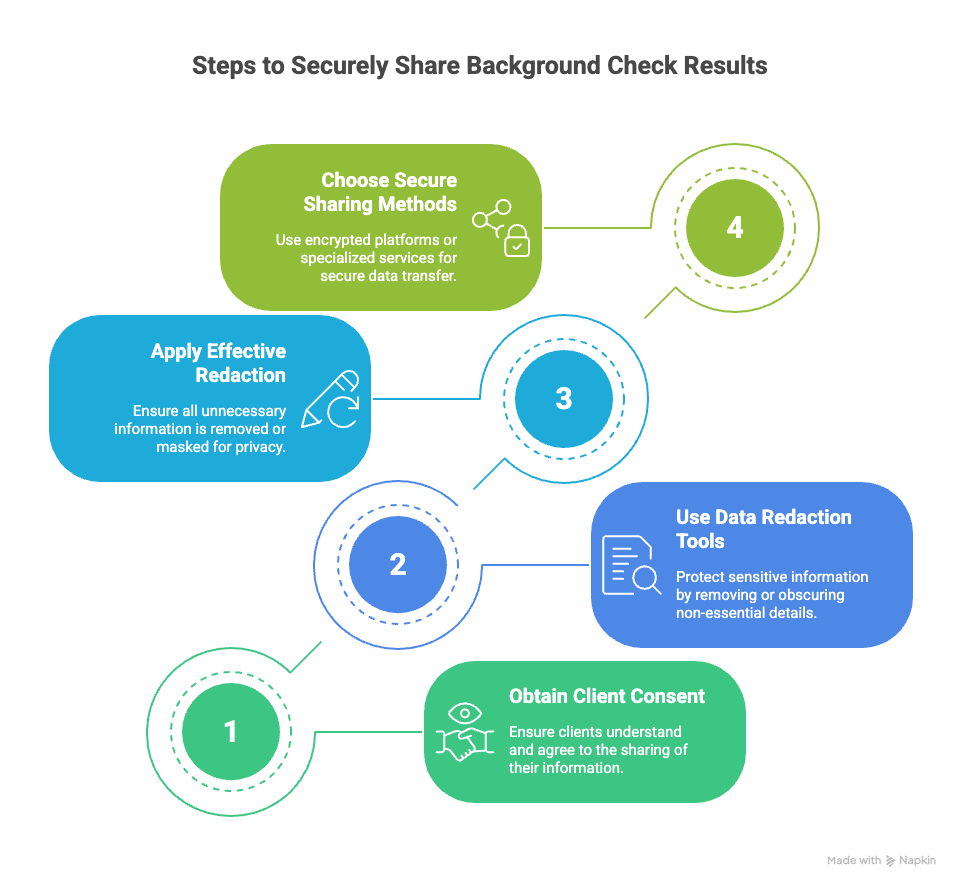Sharing background check results is an intricate process that requires a delicate balance between transparency and legal compliance. Employers and businesses need to navigate this terrain carefully to ensure they respect privacy laws while providing necessary information to clients. This guide will explore the best practices for legally sharing background check results, covering everything from consent forms to data redaction tools.
Key Takeaways
- Always obtain clear consent from individuals before conducting a background check to protect their rights.
- Understand and comply with both federal and state laws, like the Fair Credit Reporting Act, to avoid legal issues.
- Use data redaction tools to safeguard sensitive information and maintain confidentiality in background check reports.
- Share results securely via encrypted emails or digital platforms to ensure privacy and protection of data.
- Regularly review and update your background check practices to stay compliant and foster trust with clients and candidates.
Introduction
Sharing background check results is a critical step in the hiring process. It requires transparency and strict adherence to legal standards. As you know, maintaining legal compliance while being open about findings fosters trust between employers, clients, and candidates. This guide lays out the legal framework, the necessary actions, and best practices to ensure you share background check results responsibly. Following this approach will protect your business and respect the privacy and rights of individuals involved. By exercising diligence and empathy in such a procedure, human resource specialists are in a position to enhance the integrity in their selection methods. It also reveals a genuine commitment to the safety of not only the company's reputation but also the integrity of every single individual whose data we are privileged to hold.
EXPERT INSIGHT: As an HR professional, I've learned how sensitive revealing background check results is. We each have a report to represent a human with a record, and treating their data reflects our integrity as leaders. Striking a balance of transparency and compliance earns the trust of the candidate, our client, and our colleagues. Handling sensitive data with respect develops a culture where people are valued and heard. It's not ultimately a conversation about policies, but people. - Charm Paz, CHRP
Understanding Background Checks
Background checks are a common tool used in various industries to verify the history and credentials of potential employees or business associates. At their core, these checks serve to ensure that individuals align with the requirements and standards necessary for a given role or partnership.
There are several types of background checks, each serving a specific purpose. Criminal checks review an individual's past criminal records, focusing on convictions and pending cases. Credit checks assess financial responsibility, which is crucial for positions involving financial duties. Employment verifications confirm past work history, validating job roles and tenures.
The legal framework surrounding background checks is primarily governed by the Fair Credit Reporting Act (FCRA). This law mandates that employers must obtain an individual's consent before conducting a background check. The FCRA also ensures individuals are informed if any adverse action is taken based on their report. It's worth consulting the FTC guidelines for more detailed regulations and compliance information.
For you as an employer or business, understanding these components helps you use background checks responsibly and legally. It's about balancing due diligence with respect for privacy and legal rights. Are your background check practices aligning with these standards?
Legal Considerations in Sharing Background Check Results
Before you share any background check results, always obtain consent. This isn't just a box to tick; it's a legal requirement. Use client consent forms to ensure everything is documented. Without this, you're not only risking privacy but also violating laws.
Be mindful of confidentiality and privacy laws. The sharing of background check results is intersected by these regulations. Knowing when and how you can share this information helps avoid legal pitfalls.
Let's talk about the Fair Credit Reporting Act (FCRA). It sets strict guidelines on using consumer information. Employers must adhere to it when sharing background checks. This means you must inform clients of their rights, provide copies of the report if adverse action is considered, and allow them to dispute inaccuracies.
State-specific legislation can also affect how background checks are shared. While the FCRA provides a federal overview, states might have additional regulations. California, for example, has the Investigative Consumer Reporting Agencies Act, which adds another layer of requirements. Make sure you understand the rules for your state. Doing your homework here saves you from potential legal headaches.

Consider these points as a checklist every time you prepare to share a background check. It's about being thorough and compliant, ensuring everyone's rights are respected. Are you up to speed with the latest regulations? If not, it's time to review your practices.
Best Practices for Sharing Background Check Results
Securing your client's consent is step one. It's not just about asking for a signature; it’s about clarity and detail. Your background check consent forms should be explicit, stating what information will be shared and with whom. This keeps you compliant and builds trust.
When you share reports, use data redaction tools to protect sensitive data. These tools allow you to remove or obscure details like social security numbers or any non-essential personal information. Focusing on relevant details makes the report both useful and safe.
Effective redaction techniques matter. Ensure that everything that's not essential for the intended purpose is removed or masked. Investing time in understanding redaction ensures only necessary information reaches its destination.
For actual sharing, choose secure methods. Digital platforms with encryption and restricted access are ideal. Email can work if encrypted properly, but using specialized services designed for document sharing adds an extra layer of security.

These steps not only protect privacy but also keep you on the right side of the law. Implementing these practices demonstrates your commitment to respect and confidentiality in handling personal data. Which could, in turn, enhance your professional reputation. Are you ready to refine your approach?
Steps for Legally Sharing Background Check Results
- Obtain Required Consent: Before proceeding, ensure you have documented consent from the individual whose background is being checked. Use clear, straightforward consent forms that outline what the check involves and how the results will be shared. This protects you legally and respects individual rights.
- Evaluate the Information: Not all information needs to be shared. Take a close look at the background check results and determine what information is necessary for the purpose at hand. Ensure you're only sharing what's relevant to the decision-making process. This practice helps maintain privacy and minimizes unnecessary data exposure.
- Redact Sensitive Data: Use data redaction tools to remove sensitive personal information that isn't needed for your intended purpose. This includes things like Social Security numbers or personal contact information. Keep your focus on what’s pertinent to the client's needs. Effective redaction helps maintain confidentiality and adheres to privacy laws.
- Choose a Secure Sharing Method: Consider your options for sharing the background check results securely. Options include secure digital platforms, which often provide encrypted data transmissions, or encrypted emails that ensure only the intended recipient can access the content. Tailor your method based on the sensitivity of the information and the client’s preferences.
Challenges
Handling disputes over background check results can be tough. When a client challenges the accuracy of information, the first step is to listen. Understand their concerns without jumping to conclusions. Follow up by reviewing the disputed details. This review may involve checking with the original source of the information, such as a court record or previous employer. If an error is found, correct it promptly and document your actions.
Data breach risks require vigilance. Use secure platforms for storing and sharing background check results. Ensure that your team understands the importance of cybersecurity measures. Regularly update your security protocols and conduct audits to detect vulnerabilities. Encrypt sensitive information both at rest and in transit to minimize exposure if a breach occurs.
Inadequate consent happens if forms are unclear or incomplete. Prioritize clear communication in consent forms. Make sure the client understands why their information is being collected and how it will be used. If you discover insufficient consent after the fact, reach out to the client to explain the situation. Obtain new consent immediately and clearly document the process. Review and update your consent procedures regularly to prevent future issues.
Successfully overcoming these challenges involves a proactive and empathetic approach. Address disputes with care and prepare for potential security threats through solid cybersecurity practices. Finally, always aim for transparent consent processes to foster trust and avoid misunderstandings.
Conclusion
Compliance with privacy laws isn't just a legal necessity; it's an ethical duty that builds trust. Sharing background check results requires that you follow a straightforward protocol. Always obtain explicit consent. Always use secure methods for sharing information. Think of it not just as a checklist but as a commitment to integrity.
Confidentiality protects everyone involved. It shields clients from the misuse of their private information and safeguards your business from legal repercussions. When you adhere closely to regulations like the Fair Credit Reporting Act, you're not just following the law—you're demonstrating respect for your clients’ rights.
Implementing best practices like using data redaction tools and secure sharing methods is more than just a precaution; it’s about fostering a trustworthy relationship with your clients. By focusing on these elements, businesses create a culture of transparency and accountability.
Take these steps to heart. Evaluate your current practices and make the necessary adjustments. Ensure your process stays aligned with both federal and state laws. The rewards of doing so—reduced risks and enhanced trust—more than justify the effort.
Frequently Asked Questions (FAQs)
Can staffing agencies share background checks with clients without consent?
No, staffing agencies generally cannot share background checks with clients without the candidate’s written consent. The Fair Credit Reporting Act (FCRA) requires explicit permission before disclosing these reports.
What are the penalties for illegally sharing background reports?
Violating the FCRA can result in substantial penalties, including fines, statutory damages, and potential punitive damages. Both the agency and the client can face legal action for unauthorized sharing.
How to securely send background checks to clients?
You should use encrypted emails or secure portals to send background checks. These methods protect sensitive data from unauthorized access during transmission.
Do clients need FCRA compliance to receive reports?
Yes, clients must comply with FCRA requirements when receiving and using background reports. This includes ensuring the information is used solely for permissible purposes.
What should a client agreement for background checks include?
A client agreement should define the scope of the background check, consent procedures, confidentiality measures, and compliance with relevant laws. It should also outline the responsibilities of both parties.
How can a candidate dispute inaccurate information on a background check?
Candidates should contact the reporting agency directly to dispute any inaccuracies. The agency has a set timeframe to investigate and correct any errors.
What steps can a staffing agency take to ensure FCRA compliance?
Agencies should obtain written consent, provide candidates with their rights under the FCRA, and ensure accurate, up-to-date reporting. Regular training on FCRA compliance is also beneficial.
Are there any exceptions to sharing background checks without consent?
Typically, there are no exceptions under the FCRA that allow sharing without consent. However, legal obligations or court orders might require disclosure in rare situations.
How often should background checks be updated?
The frequency depends on the specific requirements of the position or client. Generally, it's advisable to update checks annually or when renewing contracts.
Definitions
Background Check
A background check is a review of a person’s history used to evaluate their qualifications or reliability for a job. It may include information such as criminal records, employment history, credit reports, or education verification. You need written consent before conducting or sharing one. Ask yourself: Are your methods aligned with legal standards?
Consent Forms
Consent forms are written agreements where individuals give permission to collect, access, or share their personal data during the hiring process. These forms should explain what information will be collected, why, and with whom it may be shared. Clear consent keeps you compliant and builds trust. Are your forms easy to understand?
Fair Credit Reporting Act (FCRA)
The FCRA is a federal law that regulates how employers use consumer information from third-party reporting agencies. It requires you to get permission before running checks and to notify candidates about adverse actions. It also gives individuals the right to dispute inaccurate findings. Have you reviewed your process to match FCRA rules?
Data Redaction
Data redaction is the removal or masking of sensitive information from a document before sharing. For background checks, this might include social security numbers, home addresses, or financial account details. Redacting helps protect privacy and lowers data breach risks. Are you sharing only what’s necessary?
Employment Verification
Employment verification confirms a candidate’s work history, including job titles, dates of employment, and sometimes reasons for leaving. This helps you confirm the accuracy of a resume and assess job relevance. Always be respectful of privacy and get consent before verifying details. Are you checking with the right sources?
References
- NACE Legal Issues Article: https://www.naceweb.org/public-policy-and-legal/legal-issues/legal-issues-background-checks/
- Thomson Reuters Background Checks Guide: https://legal.thomsonreuters.com/blog/the-importance-of-background-checks-for-employers-what-to-look-for/
- BackgroundChecks.com Blog: https://www.backgroundchecks.com/blog/can-background-checks-be-shared

GCheck Editorial Team
Meet the GCheck Editorial Team, your trusted source for insightful and up-to-date information in the world of employment background checks. Committed to delivering the latest trends, best practices, and industry insights, our team is dedicated to keeping you informed.
With a passion for ensuring accuracy, compliance, and efficiency in background screening, we are your go-to experts in the field. Stay tuned for our comprehensive articles, guides, and analysis, designed to empower businesses and individuals with the knowledge they need to make informed decisions.
At GCheck, we're here to guide you through the complexities of background checks, every step of the way.






